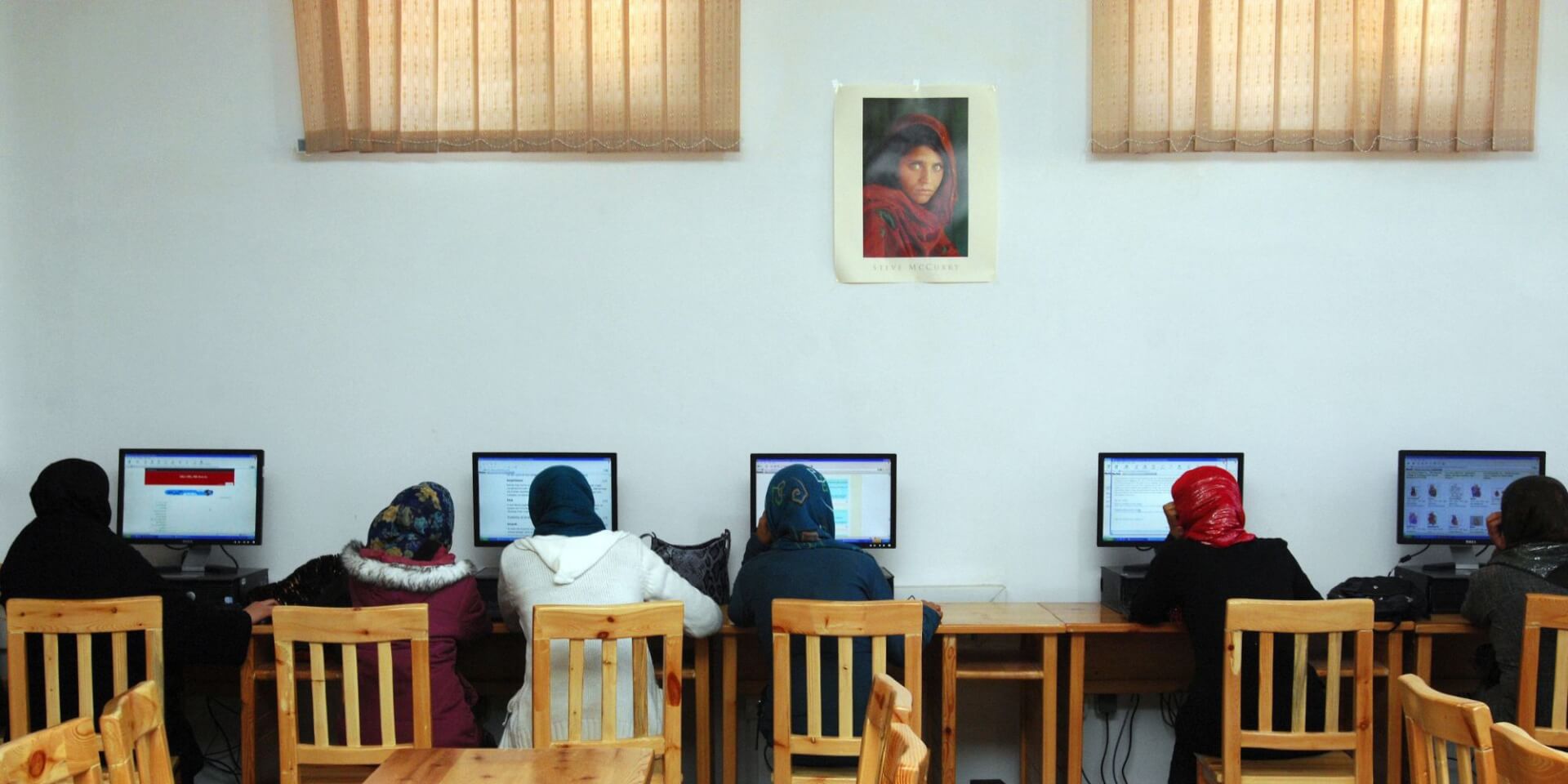
The ISC’s Committee for Freedom and Responsibility in Science (CFRS) is actively monitoring the state of science and research in Afghanistan.
In December 2022, the Afghanistan authorities decreed that higher education for women in Afghanistan would be suspended until further notice. As highlighted in the ISC’s recent Statement urging a reversal of the ban, education is a human right and a fundamental prerequisite for peace and sustainable development. The Council notes with deep concern that this recent escalation in the Afghanistan’s approach to education effectively prevents half the country’s population from learning and participating in science. This represents a severe violation of the ISC’s Principle of Freedom and Responsibility in Science and presents an existential threat to the integrity of Afghanistan’s science systems and culture. Unable to conduct their research in the face of such overwhelmingly regressive and misogynistic restrictions, and for fear of persecution, many academics and scientists are forced to flee resulting in a loss of research and education. The global scientific community must act to preserve the talent and expertise held by displaced Afghan researchers.
Please sign and share the Science in Exile Declaration to show your support.
Statements, offers of assistance and resources on the scholars in Afghanistan
The ISC will endeavour to update this list regularly.
To mark this year’s UN International Day of Education we invited ISC Governing Board Members, ISC Members and Fellows to comment on the crisis and its implications.
Comments:
Motoko Kotani
ISC Vice President for Science and Society, ISC Fellow
“All members of society have an equal role in cultivating the next generation, and no community can effectively progress when half of the population is deliberately kept back.
Ideas and innovation can only thrive when there are opposing views to push objective research and evolve academic discussions. It is important to remember that female scientists are behind some of history’s most important scientific discourses and discoveries, as well as progressive social movements. The works of Marie Curie, Jennifer Doudna, Maryam Mirzakhani and Rachel Carson, are among many, many women who have not only changed, but improved the world we live in.
The international academic community stands with Afghan women, and believes that everyone, regardless of gender, has the right to participate in the development of their community and the improvement of the world at large.”
Salim Abdool Karim
ISC Vice-President for Outreach and Engagement 2022-2024, ISC Fellow
“A well-known African proverb captures the central importance of the education of women in society, “If you educate a man, you educate one person. If you educate a woman, you educate a nation.” The morally reprehensible actions of the current government of Afghanistan in prohibiting the education of women directly undermines the future prosperity of the country.”
Karly Kehoe
Member of the Standing Committee for Freedom and Responsibility in Science 2022-2025, Member of the Steering Committee for the Science in Exile project, Global Young Academy
“At this moment, when the women and girls of Afghanistan are being denied the right to education, it falls to the rest of us to move mountains. As researchers who are committed to the common good, we must lobby our governments, our universities, and our school systems to make space for those whose futures are being stolen. This means pushing hard for fellowships, scholarships, student visas, accessible online learning tools, open access to research, and, if necessary, one-on-one teaching. We must stand for equality and support the women and girls of Afghanistan.”
Encieh Erfani
Researcher at the Abdus Salam International Centre for Theoretical Physics, Italy, ISC Fellow, Global Young Academy
“Fundamentally, the Taliban do not value girls and women, so talking about their rights makes no sense to them. They also do not value education, as they themselves are not educated, even to the point of being unable to read the Quran, which they claim to obey. Banning women from education (bearing in mind that secondary education for girls had already been banned) and from working will: cause girls to be forced to marry and become pregnant at very young ages; prevent women from receiving medical treatment, as men cannot treat them under the Taliban; and make it virtually impossible for female heads of households to provide for their families. The consequences of the Taliban’s inhumane rule are far-reaching, almost beyond imagination. This is a chilling example of where the marginalisation of women can lead, and a disaster for women’s rights, for children’s rights, for public health, and for the basic functioning of Afghanistan’s society.”
Read more from the International Community of Iranian Academics in their support for those striving and hoping for change in Afghanistan.
Dr. Saja Al Zoubi
Lecturer and Researcher, Global Development Studies, Saint Mary’s University, Halifax, Nova Scotia, Canada, Gender and Livelihood expert to the EU delegation to Syria, Steering Committee member of the ISC Science in Exile Project, Co-leader of Global Young Academy (GYA) At Risk Scholars initiative.
“Education is not gendered in Islam. One of this argument’s pillars is that the prophet himself educated his wife Aisha ‘’Peace upon them’’ to be one of the richest sources of knowledge for Muslim communities. Global efforts should be deployed to defeat Taliban pretext and secure women’s and girls’ education in Afghanistan. Afghan women are strong, but they will be stronger with all of us. Providing fellowships and host institutions for Afghan women to continue their research in peaceful host countries is critically important, but perhaps even more crucial is to secure education for girls in Afghanistan itself. This is absolutely necessary for the peaceful development of Afghanistan, and the international community must do all it can to support this goal. Of course, the traditions and culture of Afghanistan must be respected, but in no way does this, or should this, conflict with providing access to education for all of Afghanistan’s girls and women.”
What you can do to show your support for Afghan women and their right to education:
— International Science Council (@ISC) January 25, 2023
✔ Visit our action and support page and share your statements of support
✔ Sign the Science in Exile Declaration
✔ Share the ISC Statement on social media:https://t.co/0xLpdWdAx3 pic.twitter.com/7m6FCYfRbM
Recently, the northern region of Vietnam was devastated by Typhoon Yagi, locally known as typhoon 4th, one of the most severe natural disasters the area has experienced in the last 60 years. The typhoon not only caused extensive damage to infrastructure, but also tragically claimed lives and destroyed the livelihoods of many local communities, especially those in remote, mountainous and vulnerable areas. The scale of destruction was beyond what local authorities could manage, particularly affecting ethnic minority groups who already face limited resources and infrastructure. This disaster highlights a painful, but essential truth: the increasing impact of climate change is undeniable, and no single country can address its consequences in isolation.
The case of Typhoon Yagi is a powerful reminder that climate change is a global issue. Its effects do not respect borders, and no nation, no matter how developed, can single-handedly mitigate the growing frequency and intensity of climate-related disasters. The recent typhoon serves as a stark warning of the urgent need for collective action from the international community. Aid and relief efforts following Typhoon Yagi have been crucial, with international support, including from countries like Australia, playing a significant role in the recovery efforts.
However, while global cooperation is critical, my experience and reflections on this disaster have brought forward a crucial insight: as much as we need international engagement, we must also focus on empowering local communities to protect themselves. When disasters strike, local communities are always the first responders, and their ability to act quickly and effectively can mean the difference between life and death.
The aftermath of Typhoon Yagi underscores the importance of building local resilience. In many parts of Vietnam, particularly in ethnic minority and mountainous communities, the ability to respond to natural disasters is limited. These communities are often both geographically and socially isolated, making it difficult for external aid to reach them quickly. Furthermore, they are highly reliant on traditional livelihoods, such as agriculture, which are incredibly vulnerable to climate-related events. This combination of isolation, economic dependence on the land, and limited infrastructure makes these groups particularly susceptible to the impacts of typhoons, floods, and other climate-related disasters.
Empowering these vulnerable communities is essential—not only in terms of providing immediate relief but also in enabling them to rebuild and recover in a sustainable way. Local knowledge, traditions, and practices are invaluable, but they must be combined with modern disaster preparedness strategies to create resilient, self-sufficient communities that can respond effectively before external aid arrives.
Resilience is not just about physical infrastructure; it’s also about social and economic systems. For communities like those in northern Vietnam, building resilience means developing early warning systems, creating better communication networks, and training locals in disaster preparedness and response. It also means ensuring that local governments and organizations have the resources and knowledge they need to support their people. Strengthening these systems can reduce the immediate impact of a disaster, saving lives and preserving livelihoods.
However, it is essential to recognize that recovery and development must be approached with thoughtful consideration of local culture, traditions, and the specific challenges posed by climate change. Restoring livelihoods and rebuilding infrastructure, such as roads and bridges, are vital steps, but the process cannot be limited to simply erecting new facilities or resettling communities. Any efforts to rebuild must take into account the cultural and historical contexts of the affected areas. Ethnic minority communities, for example, have deep-rooted traditions tied to the land, and any development must respect and integrate these traditions to ensure that the solutions are sustainable and meaningful.
The rebuilding process must involve local voices, ensuring that communities have a say in how their environments are restored. Imposing external solutions without considering the long-standing relationships between people and their land risks alienating those most affected. Moreover, the impacts of climate change, such as altered weather patterns and natural disasters, require that new infrastructure be designed with resilience in mind. This means adapting traditional practices where necessary while preserving cultural integrity.
Typhoon Yagi has been a harsh reminder of the pressing need for global cooperation in combating climate change. International aid is indispensable in helping countries recover from disasters of this magnitude, and the outpouring of support for Vietnam in the wake of the typhoon has been both encouraging and necessary. However, international collaboration should not stop at emergency relief. It must extend to building long-term resilience in the most vulnerable communities.
This is where the intersection of global support and local empowerment becomes critical. While global frameworks and resources are necessary to address the root causes of climate change and provide immediate disaster relief, local communities need to be equipped with the tools, knowledge, and resources to protect themselves. The more vulnerable the community—such as ethnic minority groups and those living in remote, mountainous regions—the greater the need for empowerment.
The devastation caused by Typhoon Yagi is a sobering example of the challenges posed by climate change. As the frequency and severity of climate-related disasters continue to increase, so does the urgency of our response. The lessons learned from this disaster reinforce the importance of empowering local communities, especially the most vulnerable, to become resilient and self-sufficient in the face of these challenges.
However, it is equally important to recognize that development and rebuilding efforts must be approached with careful consideration of local traditions and the long-term impacts of climate change. Rebuilding is not just about constructing new facilities but about creating solutions that respect cultural values and address the vulnerabilities exacerbated by climate change.
By combining international cooperation with thoughtful, culturally sensitive local empowerment, we can better prepare for the inevitable impacts of climate change and create a more resilient future for all. Only through this dual approach can we hope to protect vulnerable communities and ensure that they are not just surviving the next disaster, but thriving in the face of it.

A guide to anticipation: Tools and methods of horizon scanning and foresight
The International Science Council, in partnership with the United Nations Environment Programme (UNEP), has conducted a comprehensive review of existing tools and methods of horizon scanning and foresight, and has convened a reflection on the evolution of foresight.

United in Science: Reboot climate action
The ISC has contributed to a new report by the World Meteorological Organization on the urgent need for climate action that must be rebooted at September’s United Nations Summit of the Future.
Photo: Lang Nu (Nu Village) traditional houses were almost completely destroyed by Typhoon Yagi (Credit: Vnexpress.net)
Disclaimer
The information, opinions and recommendations presented in our guest blogs are those of the individual contributors, and do not necessarily reflect the values and beliefs of the International Science Council
Image: Canva